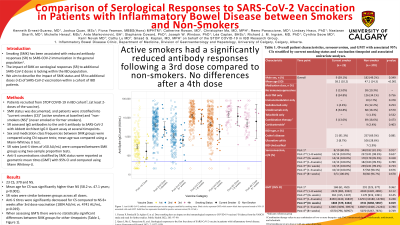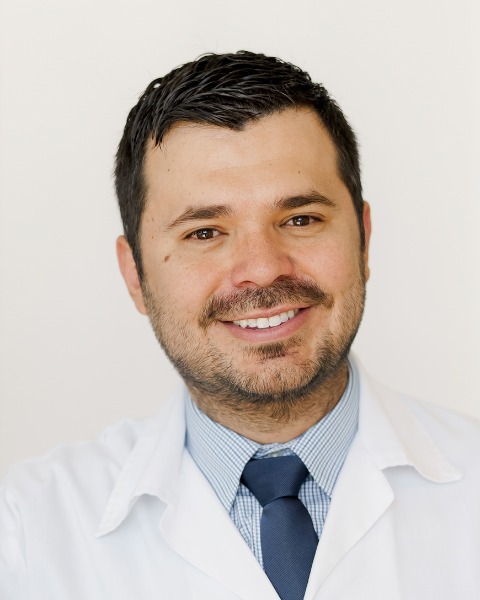Tuesday Poster Session
Category: IBD
P3537 - Comparison of Serological Responses to SARS-CoV-2 Vaccination in Patients With Inflammatory Bowel Disease Between Smokers and Non-Smokers
Tuesday, October 24, 2023
10:30 AM - 4:00 PM PT
Location: Exhibit Hall

Has Audio

Kenneth Ernest-Suarez, MD
University of Calgary
Calgary, AB, Canada
Presenting Author(s)
Kenneth Ernest-Suarez, MD1, Joshua Quan, MSc1, Fiona Yeaman, MBBS1, Christopher Ma, MD2, Remo Panaccione, MD1, Catherine Rowan, MD1, Lindsay Hracs, PhD1, Nastaran Sharifi, MD1, Michelle Herauf, MSc1, Ante Markovinović, BA1, Stephanie Coward, PhD1, Joseph W.. Windsor, PhD1, Léa Caplan, BHSc1, Richard J. M.. Ingram, MD, PhD1, Cynthia Seow, MD1, Kerri Novak, MD1, Cathy Lu, MD, MSc1, Gilaad G. Kaplan, MD, MPH1
1University of Calgary, Calgary, AB, Canada; 2Alimentiv Inc., University of Calgary, London, ON, Canada
Introduction: Smoking (SMK) has been associated with reduced IgG antibody responses to two-dose regimens of SARS-COV-2 immunization in the general population1. The impact of SMK on serological responses (SR) to additional SARS-CoV-2 doses is lacking within the IBD population. We aim to describe the impact of SMK status and SR to additional doses ( >2) of SARS-CoV-2 vaccination within a cohort of IBD patients.
Methods: Patients were recruited from a cohort of SARS-CoV-2 vaccinated adults with a diagnosis of IBD (STOP COVID-19 in IBD)2, and all had a minimum of two doses of the vaccine. SMK status was documented at recruitment; individuals were stratified into “current smokers” (active smokers at baseline) and “non-smokers” (never smoked or former smokers). SR were assessed via concentration of IgG antibodies to the spike protein of SARS-CoV-2 (anti-S) using the Abbott Architect IgG II Quant assay at several timepoints following vaccination: 1–8 weeks after 1st dose vaccination, and both 1–8 weeks and 8+ weeks after 2nd, 3rd, and 4th dose. Sex, age, and medication status at 1st dose vaccination were collected through chart review. Sex and medication class frequencies between SMK groups were compared using Chi-square tests; mean age was compared using a Mann-Whitney U test. SR rates, defined as the proportion of individuals with anti-S titres of ≥50 AU/mL, were compared between SMK groups using two-sample proportion tests. Anti-S concentrations stratified by SMK status were reported as geometric mean titres (GMT) with 95% confidence intervals and compared using Mann Whitney-U tests.
Results: There were 23 current smokers, 370 and non-smokers. The mean age for smokers was significantly higher than non-smokers (58.2 vs. 47.1 years; p< 0.001). SR rates were similar between SMK groups across all vaccine doses. Anti-S titres were significantly decreased for smokers compared to non-smokers 8+ weeks after 3rd dose vaccination (1804 AU/mL vs. 4741 AU/mL, p=0.019). When assessing GMTs there were no statistically significant differences between SMK groups for other timepoints (Table 1, Figure 1).
Discussion: In this cohort, active smokers had significantly reduced antibody responses following 3rd dose vaccination compared to non-smokers. This difference was not observed following 4th dose vaccination. Therefore, a 4th dose of SARS-CoV-2 vaccine should be recommended for patients with IBD, particularly active smokers. These data also reinforce the importance of advising SMK cessation within the IBD population.

Disclosures:
Kenneth Ernest-Suarez, MD1, Joshua Quan, MSc1, Fiona Yeaman, MBBS1, Christopher Ma, MD2, Remo Panaccione, MD1, Catherine Rowan, MD1, Lindsay Hracs, PhD1, Nastaran Sharifi, MD1, Michelle Herauf, MSc1, Ante Markovinović, BA1, Stephanie Coward, PhD1, Joseph W.. Windsor, PhD1, Léa Caplan, BHSc1, Richard J. M.. Ingram, MD, PhD1, Cynthia Seow, MD1, Kerri Novak, MD1, Cathy Lu, MD, MSc1, Gilaad G. Kaplan, MD, MPH1. P3537 - Comparison of Serological Responses to SARS-CoV-2 Vaccination in Patients With Inflammatory Bowel Disease Between Smokers and Non-Smokers, ACG 2023 Annual Scientific Meeting Abstracts. Vancouver, BC, Canada: American College of Gastroenterology.
1University of Calgary, Calgary, AB, Canada; 2Alimentiv Inc., University of Calgary, London, ON, Canada
Introduction: Smoking (SMK) has been associated with reduced IgG antibody responses to two-dose regimens of SARS-COV-2 immunization in the general population1. The impact of SMK on serological responses (SR) to additional SARS-CoV-2 doses is lacking within the IBD population. We aim to describe the impact of SMK status and SR to additional doses ( >2) of SARS-CoV-2 vaccination within a cohort of IBD patients.
Methods: Patients were recruited from a cohort of SARS-CoV-2 vaccinated adults with a diagnosis of IBD (STOP COVID-19 in IBD)2, and all had a minimum of two doses of the vaccine. SMK status was documented at recruitment; individuals were stratified into “current smokers” (active smokers at baseline) and “non-smokers” (never smoked or former smokers). SR were assessed via concentration of IgG antibodies to the spike protein of SARS-CoV-2 (anti-S) using the Abbott Architect IgG II Quant assay at several timepoints following vaccination: 1–8 weeks after 1st dose vaccination, and both 1–8 weeks and 8+ weeks after 2nd, 3rd, and 4th dose. Sex, age, and medication status at 1st dose vaccination were collected through chart review. Sex and medication class frequencies between SMK groups were compared using Chi-square tests; mean age was compared using a Mann-Whitney U test. SR rates, defined as the proportion of individuals with anti-S titres of ≥50 AU/mL, were compared between SMK groups using two-sample proportion tests. Anti-S concentrations stratified by SMK status were reported as geometric mean titres (GMT) with 95% confidence intervals and compared using Mann Whitney-U tests.
Results: There were 23 current smokers, 370 and non-smokers. The mean age for smokers was significantly higher than non-smokers (58.2 vs. 47.1 years; p< 0.001). SR rates were similar between SMK groups across all vaccine doses. Anti-S titres were significantly decreased for smokers compared to non-smokers 8+ weeks after 3rd dose vaccination (1804 AU/mL vs. 4741 AU/mL, p=0.019). When assessing GMTs there were no statistically significant differences between SMK groups for other timepoints (Table 1, Figure 1).
Discussion: In this cohort, active smokers had significantly reduced antibody responses following 3rd dose vaccination compared to non-smokers. This difference was not observed following 4th dose vaccination. Therefore, a 4th dose of SARS-CoV-2 vaccine should be recommended for patients with IBD, particularly active smokers. These data also reinforce the importance of advising SMK cessation within the IBD population.

Figure: Figure 1. Anti-SARS-CoV-2 antibody concentration per vaccine category stratified by smoking status. Black circles represent GMTs while narrow black bars represent bounds of 95% CI associated with each GMT. Solid blue line represents threshold for positive seroconversion (50 AU/mL).
Disclosures:
Kenneth Ernest-Suarez: AstraZeneca – Advisor or Review Panel Member, Consultant. Ferring – Advisor or Review Panel Member, Consultant. Janssen – Advisor or Review Panel Member, Consultant. Pfizer – Advisor or Review Panel Member, Consultant. Sandoz – Advisor or Review Panel Member, Consultant.
Joshua Quan indicated no relevant financial relationships.
Fiona Yeaman indicated no relevant financial relationships.
Christopher Ma: AbbVie – Consultant, Speakers Bureau. Alimentiv – Consultant, Speakers Bureau. Amgen – Consultant, Speakers Bureau. AVIR Pharma Inc – Consultant, Speakers Bureau. BioJAMP – Consultant. Bristol Myers Squibb – Consultant, Speakers Bureau. Celltrion – Consultant. Ferring – Consultant, Grant/Research Support, Speakers Bureau. Fresenius Kabi – Consultant, Speakers Bureau. Janssen – Consultant, Speakers Bureau. McKesson – Consultant. Mylan – Consultant. Pendopharm – Consultant, Speakers Bureau. Pfizer – Consultant, Grant/Research Support, Speakers Bureau. Prometheus Biosciences Inc. – Consultant. Roche – Consultant. Sanofi – Consultant. Springer Publishing – Royalties. Takeda – Consultant, Speakers Bureau.
Remo Panaccione: Abbivax – Consultant. Abbott – Consultant. AbbVie – Consultant. Alimentiv – Consultant. Amgen – Consultant. Arena – Consultant. AstraZeneca – Consultant. Biogen – Consultant. Boehringer Ingelheim – Consultant. Bristol Myers Squibb – Consultant. Celgene – Consultant. Celltrion – Consultant. Cosmos Technology – Consultant. Eisai – Consultant. Elan – Consultant. Eli Lilly – Consultant. Ferring – Consultant. Fresenius Kabi – Consultant. Galapagos – Consultant. Genentech – Consultant. Gilead Sciences – Consultant. GlaxoSmithKline – Consultant. JAMP Bio – Consultant. Janssen – Consultant. Merck – Consultant. Mylan – Consultant. Novartis – Consultant. Oppilan Pharma – Consultant. Organon – Consultant. Pandion Pharma – Consultant. Pendopharm – Consultant. Pfizer Inc – Consultant. Progenity – Consultant. Prometheus – Consultant. Protagonist Therapeutics – Consultant. Roche – Consultant. Sandoz – Consultant. Satisfai Health – Consultant. Shire – Consultant. Sublimity Therapeutics – Consultant. Takeda Pharmaceuticals – Consultant. Theravance Biopharma – Consultant. Trellus – Consultant. UCB – Consultant. Ventyx – Consultant. Viatris – Consultant.
Catherine Rowan indicated no relevant financial relationships.
Lindsay Hracs indicated no relevant financial relationships.
Nastaran Sharifi indicated no relevant financial relationships.
Michelle Herauf indicated no relevant financial relationships.
Ante Markovinović indicated no relevant financial relationships.
Stephanie Coward indicated no relevant financial relationships.
Joseph Windsor indicated no relevant financial relationships.
Léa Caplan indicated no relevant financial relationships.
Richard Ingram indicated no relevant financial relationships.
Cynthia Seow: Abbvie – Advisor or Review Panel Member, Consultant. Bristol Myers Squibb – Advisor or Review Panel Member, Consultant. Fresenius Kabi – Advisor or Review Panel Member, Consultant. Janssen – Advisor or Review Panel Member, Advisory Committee/Board Member, Consultant. Pfizer – Advisor or Review Panel Member, Consultant. Takeda – Advisor or Review Panel Member, Consultant.
Kerri Novak: Abbvie – Advisor or Review Panel Member, Consultant, Grant/Research Support. Bristol Myers Squibb – Advisory Committee/Board Member. Celltrion – Advisory Committee/Board Member. Ferring – Advisory Committee/Board Member. Fresenius Kabi – Advisory Committee/Board Member. Janssen – Advisor or Review Panel Member, Consultant. McKesson – Advisory Committee/Board Member. Pfizer – Advisor or Review Panel Member, Consultant, Grant/Research Support. Takeda – Advisor or Review Panel Member, Consultant.
Cathy Lu: Abbvie – Advisory Committee/Board Member. Ferring – Advisory Committee/Board Member. Fresenius Kabi – Advisory Committee/Board Member. Janssen – Advisory Committee/Board Member. Takeda – Advisory Committee/Board Member.
Gilaad Kaplan: AbbVie (received honoraria) – Consultant, Speaking. Amgen (received honoraria) – Consultant, Speaking. Ferring – Grants for research support. Janssen (received honoraria) – Consultant, Speaking. Pendophram (received honoraria) – Consultant, Speaking. Pfizer (received honoraria) – Consultant, Speaking. Sandoz (received honoraria) – Consultant, Speaking. Takeda (received honoraria) – Consultant, Speaking. TREATMENT OF INFLAMMATORY DISORDERS, AUTOIMMUNE DISEASE, AND PBC. UTI Limited Partnership, assignee. Patent WO2019046959A1. PCT/CA2018/051098. 7 Sept. – Intellectual Property/Patents.
Kenneth Ernest-Suarez, MD1, Joshua Quan, MSc1, Fiona Yeaman, MBBS1, Christopher Ma, MD2, Remo Panaccione, MD1, Catherine Rowan, MD1, Lindsay Hracs, PhD1, Nastaran Sharifi, MD1, Michelle Herauf, MSc1, Ante Markovinović, BA1, Stephanie Coward, PhD1, Joseph W.. Windsor, PhD1, Léa Caplan, BHSc1, Richard J. M.. Ingram, MD, PhD1, Cynthia Seow, MD1, Kerri Novak, MD1, Cathy Lu, MD, MSc1, Gilaad G. Kaplan, MD, MPH1. P3537 - Comparison of Serological Responses to SARS-CoV-2 Vaccination in Patients With Inflammatory Bowel Disease Between Smokers and Non-Smokers, ACG 2023 Annual Scientific Meeting Abstracts. Vancouver, BC, Canada: American College of Gastroenterology.
